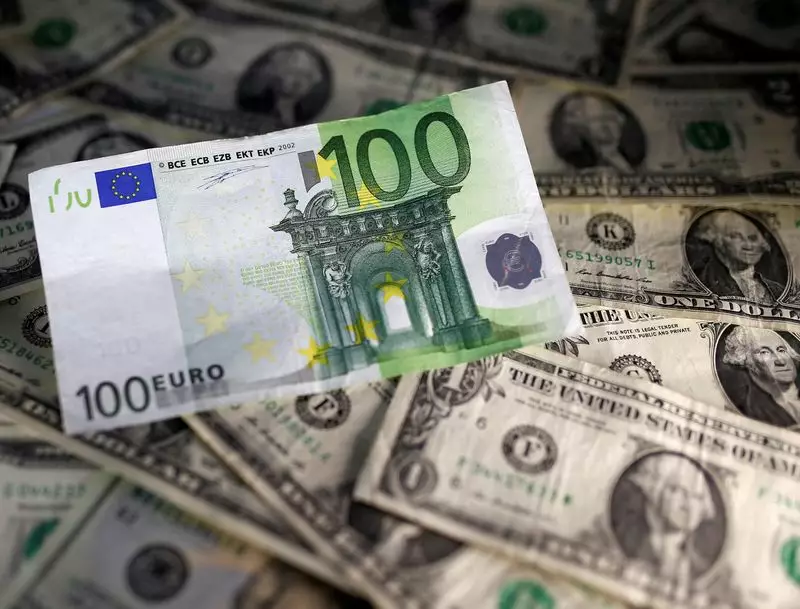On a particularly turbulent Thursday, the euro exhibited a distinct lack of momentum, grappling with mounting uncertainty following the anticipated collapse of the French government. This political shift has raised alarm bells about the stability of France, which stands as the eurozone’s second-largest economy. The currency struggled around the $1.052 mark, teetering close to lows last seen two years ago, as traders braced themselves for what could be a prolonged period of political instability and legislative paralysis in France. The situation escalated as French lawmakers successfully passed a no-confidence motion, which places significant pressure on the government’s ability to address critical issues like the burgeoning budget deficit.
The ramifications of governmental collapse extend far beyond France’s borders, posing concerns for the broader eurozone economy. Charlotte de Montpellier, an economist at ING, indicated that the fallout from this political crisis would linger, adversely affecting both business and consumer confidence. As the process of appointing a new prime minister unfolds—complicated by the potential for further no-confidence votes—it seems likely that France could remain adrift politically for several months. This uncertainty only amplifies the already fragile state of the euro, which appears trapped under the weight of these developments.
In stark contrast to the euro’s struggles, Bitcoin, the flagship cryptocurrency, soared past the $100,000 mark for the first time in its history, achieving a staggering value of $101,626 during Asian trading hours. This meteoric rise signifies a bullish sentiment within the cryptocurrency market, particularly influenced by expectations surrounding the incoming U.S. administration led by Donald Trump. Analysts speculate that a potentially favorable regulatory environment for cryptocurrencies could usher in a new era of investment and growth.
Kyle Rodda, a senior market analyst, articulated that the benefits of a reduced regulatory risk, combined with a general attraction to non-fiat assets due to a skeptical perception of U.S. fiscal policies and looming geopolitical unrest, are factors contributing to Bitcoin’s remarkable rally. With gains of approximately 138% year-to-date, the bullish fervor surrounding Bitcoin seems to have secured its position as the focal point of market discussion, drawing attention away from traditional currency movements.
As market participants scrutinize the economic implications of political developments, central banks find themselves at a crossroads. The European Central Bank (ECB) faces increasing pressure as fears of destabilizing market conditions rise. While ECB President Christine Lagarde acknowledged the importance of maintaining financial stability, she refrained from committing to any specific interventions as the French political crisis unfolds. The central bank is anticipated to take bold measures in response to the intense pressure, with traders forecasting rate cuts to stimulate economic growth.
In a broader context, the U.S. Federal Reserve is also navigating its own balance of rate adjustments amid fluctuating economic indicators. Despite a promising employment outlook projected for the upcoming non-farm payrolls report, a 74% probability of a 25-basis-point rate cut indicates investors’ faith in monetary easing. Federal Reserve Chair Jerome Powell’s recent remarks suggested a cautious optimism about the economy but acknowledged that the path ahead would require a deft handling of interest rate policies.
Turning to Asia, the South Korean won displayed resilience amidst the backdrop of external pressures, remaining stable despite recent market tumult triggered by President Yoon Suk Yeol’s controversial handling of martial law. With the government pledging to unleash significant market stabilization funds, investors are awaiting clarity as lawmakers contemplate impeachment proceedings against Yoon. The won, however, continues to hover around its two-year lows, reflecting the ongoing challenges faced within the region.
In contrast, Japan’s yen showed slight strengthening, suggesting that market players are weighing the possibility of interest rate hikes by the Bank of Japan in the near term. With a projected 60% likelihood of a December increase, traders are keeping a vigilant eye on evolving economic data for further insights into the central bank’s trajectory.
As the geopolitical landscape continues to shift, with turmoil in France and a bullish trend in cryptocurrencies, market participants are bracing for a volatile period ahead. The interconnectedness of political stability, central bank policies, and market reactions will ultimately chart the course for economic performance across both Europe and Asia. Investors must remain alert as they navigate these challenges, particularly in a landscape where both traditional currencies and digital assets are vying for attention amidst unprecedented changes.

